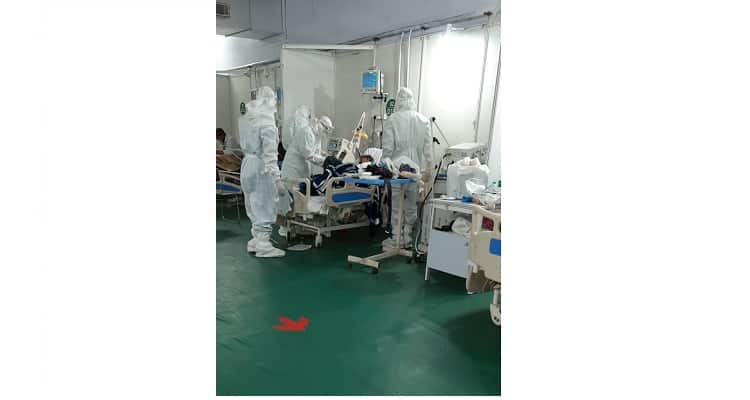Vaccinations cross 13.83 crore, with over 29 lakh doses administered in last 24 hours while 3,46,786 new cases and 2,624 deaths were registered in the same period
As per health ministry data, the cumulative number of COVID-19 vaccine doses administered in the country has crossed 13.83 crore.
Over 29 lakh vaccination doses were administered in the last 24 hours while 3,46,786 new cases and 2,624 deaths were registered in the same period.
Ten states including Maharashtra, Uttar Pradesh, Delhi, Karnataka, Kerala, Chhattisgarh, Madhya Pradesh, Tamil Nadu, Gujarat and Rajasthan report 74.15 per cent of the new cases. India’s total active caseload has reached 25,52,940. It now comprises 15.37 per cent of the country’s total positive cases. A net incline of 1,24,324 cases recorded from the total active caseload in the last 24 hours. The national mortality rate has been falling and currently stands at 1.14 per cent, as her the data.
Ten states account for 82.28 per cent of the new deaths. Maharashtra saw the maximum casualties (773). Delhi follows with 348 daily deaths.
Maharashtra has also reported the highest daily new cases at 66,836. It is followed by Uttar Pradesh with 36,605 while Kerala reported 28,447 new cases.
Strategy for effective implementation of the New Vaccination Strategy (Phase-3)
Union Health Secretary Shri Rajesh Bhushan and Dr R S Sharma, Chairman, Empowered Group on Technology and Data Management to combat COVID-19 chaired a high-level meeting to guide the States/UTs on effective implementation of the New Vaccination Strategy (Phase-3) and to review their augmentation plans so as to strengthen the existing hospital and clinical treatment infrastructure for COVID patients.
As per a health ministry release, Dr Sharma noted that the CoWIN platform has now stabilised and is working at scale flawlessly. It is equipped to handle the complexities of the new phase of vaccination starting from May 1. He highlighted the importance of uploading correct and timely data by States/UTs as any incorrect data would compromise the integrity of the entire system.
With regards to the Phase III Vaccination strategy from May 1, 2021, the States were specifically advised to:
- Register additional private COVID Vaccination Centres (CVCs) in mission mode by engaging with private hospitals, hospitals of industrial establishments, industry associations, etc., coordinating with designated appropriate authority, mechanism for applications/requests and their processing and monitoring of pendency of registration.
- Monitor number of hospitals that have procured vaccines and have declared stocks and prices on COWIN.
- Schedule vaccination for eligible population for providing adequate visibility of vaccination slots on COWIN.
- Prioritise decision regarding direct procurement of vaccines by State/UT Government.
- Publicise about facility of ‘only online registration’ for age groups 18-45 year.
- Train CVC staff about vaccination, AEFI reporting and management, Use of COWIN – training schedule and reconciliation of vaccine stocks have been already provided to private CVCs.
- Coordinate with law-and-order authorities for effective crowd management at CVCs.
Regarding infrastructure augmentation for effective clinical treatment of the hospitalised COVID patients, states were advised to review their existing hospital and other COVID-19 treatment infrastructure in light of the daily new case, daily fatality and those that would require hospitalisation.
To prepare and implement a Comprehensive Plan for Augmentation, the States were advised to:
- Identify additional dedicated COVID-19 hospitals and prepare field hospital facilities either through DRDO, CSIR or similar agencies in the public and private sector.
- Ensure adequacy in terms of oxygen supported beds, ICU beds and oxygen supplies. Setting up centralised call center-based services for allocation of beds.
- Deploy of requisite Human Resources with proper training and mentoring of doctors and nurses for management of patients and strengthening ambulance services.
- Establish of sufficient referral linkages for districts with deficit infrastructure through deployment of additional ambulances.
- Set up of centralised call center-based services for allocation of beds.
The States were also advised to:
- Maintain a real-time record for available beds and make is easily accessible to general public
- Create guidelines and enable states to take over private health facilities to provide COVID-19 care
- Expand designated COVID-19 care facilities for isolation of asymptomatic and mild symptomatic patients so that all those who either cannot isolate at home and/or are willing for institutional isolation, have access to the requisite space and care
- Provide tele-medicine facilities for patients who are isolated at home
- Ensure adequate availability of oxygen, ventilators and intensive care under trained doctors, as well as access to steroids and other drugs as appropriate
- step up creation of in-hospital oxygen plants in large hospitals
- Pay fair and regular remuneration to ASHAs and other frontline workers who are being engaged for COVID-19
Various steps taken by the Union Government to augment hospital infrastructure in the States and UTs were reiterated, such as Union Government’s instructions to hospitals under the control of Central departments/PSUs to set-up exclusive dedicated hospitals or separate blocks within the hospitals.
The plan to set up temporary COVID Care facilities and makeshift hospitals, including ICU beds, in coordination with the DRDO and CSIR-CBRI was re-iterated. The State/UTs were guided to co-ordinate with corporate entities/PSUs/Government Departments for their CSR funds to facilitate setting up makeshift hospitals and temporary COVID care facilities.
Cooperation with National Cooperative Development Corporation (NCDC) for repurposing healthcare facilities (spread across 18 regional offices) for creation of COVID-19 facilities was also advised.
They were also advised to use railway coaches for management of mild cases; details of availability of 3,816 such coaches, across 16 Zones of Railways have been shared with the states.
- Advertisement -


